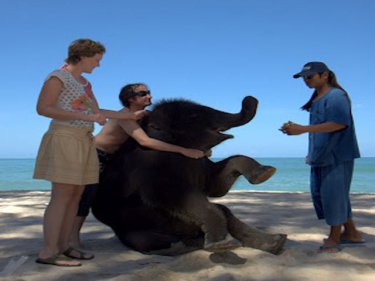An emotive video entitled: 'Elephant Smuggling Exposed: How Thailand's tourism industry is driving a brutal trade in baby elephants' has been released at the same time as publication of an article headlined: 'The agonising blows that expose the evil secrets of Thailand's elephant tourism con: The Duchess of Cornwall's brother tells how baby elephants are brutally starved and tortured.'
Patting a baby elephant on Phuket or riding one on a trek seems quite distant from brutality and torture but the video by the Ecologist Film Unit draws a direct connection.
The film's makers claim that with wild elephants protected in Thailand, scores of baby elephants are being poached across the border in Burma where as many as five protective adult elephants have to be killed to capture one young animal.
According to wildlife experts quoted in the video, the trade is so broad that it is threatening the survival of the Asian elephant species.
Coupled with the nightmare impression that is being created about the trade that supplies baby elephants to tourism are claims that young elephants go through a brutal beating to break their spirit.
An article in Britain's best-selling 'Daily Mail' says that the poaching trade in Burma is so large ''it is thought that the endangered wild elephant population there - estimated at up to 5000 individuals - could be wiped out or damaged beyond repair within 10 years or so.''
The article, written by activist Mark Shand of Elephant Family, continues: ''The Asian elephant is facing extinction and is listed as 'endangered' on the International Union for Conservation of Nature Red List, the world's most comprehensive inventory of the conservation status of species.
''With an estimated 25,000 to 35,000 left in the wild, there is roughly one Asian elephant to every 20 African elephants.''
The video and the article both expose believable torment of juvenile elephants destined for Thailand's tourism trade.
Shand writes: ''Undercover cameras filmed the elephants as they endured the dreaded phajaan, a cruel, spirit-breaking ritual where the baby calves will be tied up, with no food and water, and beaten relentlessly for days on end.
''It is pure torture and according to experts we spoke to, very often the calves will die from their injuries or from stress, starvation or the sheer heartbreak of seeing their family killed in front of their eyes.''
Authorities in Thailand are quoted as saying they have intensified efforts to stop the trade but wildlife experts say the prices being paid for immature elephants guarantee the trade will continue.
On Phuket, attention has turned to the ceiling placed on the number of elephants after authorities earlier this year confiscated two young elephants whose birth details could not be clearly traced.
The seizures diverted attention from spurious claims that elephants were being stolen from other parts of Thailand, killed then served as meals in Phuket restaurants.
While the ''elephants for dinner'' claims were always unlikely to be proven, the latest wave of disclosures about the state of the Asian elephant is likely to alarm visitors who would in the past have been content to go for an elephant ride.
Like the wide-eyed lorises and other wild creatures used for commercial gain on Phuket by Patong touts, the revelations about the treatment of elephants are likely to increase the number of Phuket visitors who choose to not become connected to mistreatment of the elephant species.
About 15 of Phuket's 188 registered elephants are under five years of age, but their births were not in the wild, acording to the records of the Phuket Livestock Office.
''As Burma increasingly opens up to the rest of the world, there are fears that the growth of the tourist industry there could be disastrous for the country's remaining wild elephants,'' Shand writes.
''A rigorous and watertight registration scheme should be put in place for all elephants in Thailand - young and old alike.
''This should be backed up with a DNA database, something that the Thai government set out to do earlier this year but on which it has been unable to make much progress.''
He adds that Elephant Family is not calling for a boycott of elephant camps, ''which would be disastrous for elephants because the camps rely on tourist income to feed and care for them.
''Tourists should instead report any concerns they may have to their hotel or tour operator, and otherwise support our efforts for change if they want to make a difference.
''If Thailand's brutal baby elephant trade is not ended soon, Asia's last remaining populations of wild elephants in Burma may be lost for ever. All for the sake of a tourist photo-opportunity.''










A sad story indeed, which I haven't seen but I will try and watch this.
Tourism drives greed, which in turn makes more people want elephants, lorises or other animals.
The last part about informing a tour guide or something, will not get any where.
I think you should print a direct number to the official who is in charge of Animal Welfare. Maybe he can come to the weekend market on Saturday and confiscate all the illegal animals that go on there.
Posted by Tbs on July 25, 2012 16:49